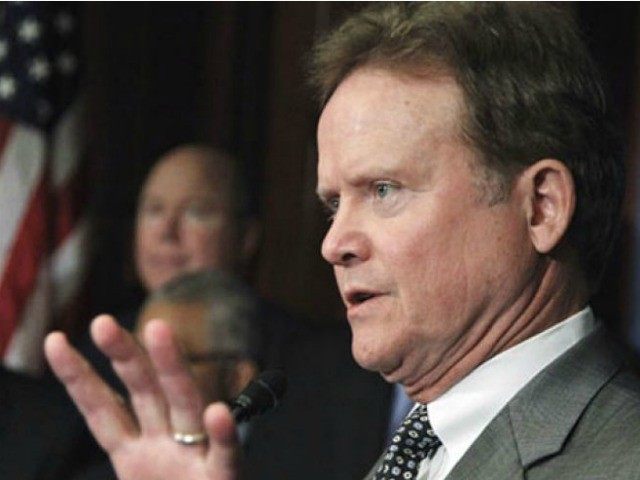In the tragic shooting deaths of nine African Americans, once again some in the press along with political leadership and even business leadership are attempting to turn a tragedy into a shameful opportunity to destroy an important part of American history.
There has been intense pressure from many in the press and politics to eradicate the Confederate Battle Flag, not the Confederate national flag from just about everywhere. Never failing to pile on, Hillary Clinton says we should ban the Confederate Battle Flag everywhere. The pressure for everyone to succumb to this extortion is intense, and all of the pressure is purely emotional, much of it incoherent and incorrect. Mother Jones attempted to pressure former U.S. Senator Jim Webb to fall in line with the headline, “Webb is the Only Presidential Hopeful Who Won’t Comment.”
Yet only Jim Webb has since tried to voice some reason above this manic clamor.
Webb posted on Facebook:
This is an emotional time and we all need to think through these issues with a care that recognizes the need for change but also respects the complicated history of the Civil War. The Confederate Battle Flag has wrongly been used for racist and other purposes in recent decades. It should not be used in any way as a political symbol that divides us.
But we should also remember that honorable Americans fought on both sides in the Civil War, including slave holders in the Union Army from states such as Missouri, Kentucky, Maryland and Delaware, and that many non-slave holders fought for the South. It was in recognition of the character of soldiers on both sides that the federal government authorized the construction of the Confederate Memorial 100 years ago, on the grounds of Arlington National Cemetery.
As Webb stated, the Battle Flag has been, unfortunately, used for racial purposes, but it has more often been used as a symbol of rebelliousness and Southern pride. This Battle Flag has a history that should not be erased, but understood. Look at that flag at a NASCAR race and what does it represent? It represents good ole boys and stickin’ it to the man, and feeling proud to be Southern. NASCAR itself has its roots in rebels runnin’ moonshine in souped up cars.
This southern independent streak was the bare emotional nerve, cloaked in states’ rights, used to disingenuously sell the poor Southerners on secession and war. They became the terrible fodder for that war. Yes, slavery was the economic issue, but waving the States rights banner in front of a bunch rebellious Southerners was the successful emotional appeal to most Southerners who saw no economic benefit from the continuation of slavery.
Only 33% of whites in the South owned slaves (according to the 1860 census). Why else would so many non-slave owners take up arms for the South? At that time, barely 80 years had passed since the American Revolution; most individuals’ loyalties were to their state, not to the federal government.
General Lee agreed with the Union cause, but his conscience forced him to defend his State of Virginia. What did that flag represent to Lee? Likely it was his soldiers and their bravery, not slavery. He once said in battle, “It is well that war is so terrible, otherwise we would grow too fond of it.”
The wealthy slaveholding leaders in the state houses seceded in an emotional clamor similar to the accusatory one we see today. Rather than learn from the emotionalism that often creates huge problems, the press, and our leadership, just like at the outset of the Civil War, are pointing fingers and using innuendo to force a result they neither understand nor care to.
If we ban the Confederate battle flag when someone only circuitously connected to it commits a heinous crime, why not ban the gay rights flag and the Cross of Christ if a gay priest serially molests young children, or ban the Koran if a jihadist commits mass murder?
What I believe Jim Webb sees is the tragedy that this battle flag represents—one that should be remembered. Many years ago, Jim sent me this poem written by another McKim on the Confederate memorial in Arlington Cemetery:
Not for fame or reward
Not for place or for rank
Not lured by ambition nor goaded by necessity
But in simple obedience to duty
As they understood it
These men sacrificed all
Dared all
And died.
The tragedy is that 620,000 soldiers on both side died in the Civil War, more than any other war fought and more than all other wars together excepting WWII. Yes, this was a terrible war to free slaves. The war and the sacrifice should be remembered and understood, not used for yet more demagoguery.
President Obama’s first Chief of Staff Rahm Emmanuel said, “You never want a serious crisis to go to waste.” Do we wipe out this flag and wipe out the memory of sacrifices that it took to free the slaves, and wipe the awful lessons that came with that? Do we encourage this emotionalism that has been used to instigate most conflicts—racial, civil or social–in world history?
Man’s natural instinct is to avoid catastrophic conflict. It is only through this kind of fomentation that we destroy each other. If we persist in this kind of provocation while at the same time destroying the symbols of those terrible lessons, we will most certainly repeat them.

COMMENTS
Please let us know if you're having issues with commenting.